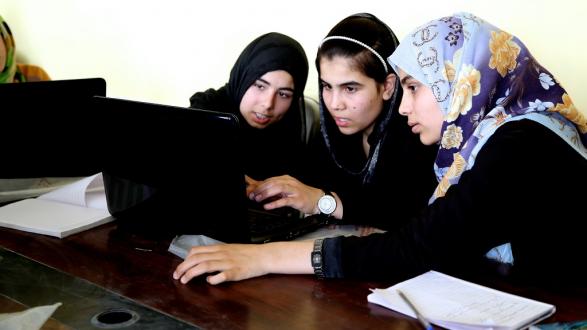In:
Global Beat is your weekly stop for news from around the world. Join us every Friday morning for important stories you should know about.
This week, Afghanistan opens an all-women’s coding school; U.S.-based airplane producer Boeing announces a contract with Iran; African nations aim to end child marriage; and more.
____________________
Americas
In what is becoming a regular fact of life for regions all over the world, Central American countries are struggling through a prolonged and severe drought. In Guatemala, the drought is contributing to seasonal food scarcity. The UN Food and Agriculture Organization said that nearly three million people in Guatemala, El Salvador, and Honduras need food aid due to drought.
Also check out:
- President Obama meets with families and survivors in Orlando – Merrit Kennedy, NPR
Central & South Asia
Afghanistan has recently opened an all-women’s institution for computer coding. The school is called Code to Inspire and serves to educate a class of 50 women. Its website notes that 85 percent of women in Afghanistan have not had access to higher education and are illiterate. In a country formerly run by the Taliban, setting up a female training program for coding is a significant step forward in educating Afghan women and allowing them to establish essential and marketable skills for future careers. News Deeply describes it as “a quiet revolution.”
Also check out:
- Bangladesh crackdown: more than 14,000 arrests, yet machete attacks continue – Mainul Islam Khan and Shashank Bengali, Los Angeles Times
China & East Asia
As China becomes more open to the world economy its attitude towards foreign media remains complex, according to an interview this week with NPR reporter Frank Langfitt. The government has become increasingly more negative in its portrayal of foreign journalism to its people, he said, adding that the government sees foreign reporters as “a threat to their rule.” In February, China instituted greater restrictions on all foreign media entities.
Also check out:
- Change is brewing as Chinese switch to coffee – Al Jazeera
Europe & Russia
The Euro 2016 soccer tournament in France has been besieged by cases of extreme fan violence, most notably between Russian and English fans. Russia’s team received a suspended ban and could be kicked out of the tournament if their fans continue the violence, which has gotten so out of control that French police have used tear gas. French authorities are attempting to get a handle on the situation while also dealing with terrorist threats. The ISIS-aligned terrorist who killed a French police officer and his wife said in a video posted online that the tournament “will be a graveyard.”
Also check out:
- Portugal runs for four days straight on renewable energy alone – Arthur Neslen, The Guardian
Middle East & North Africa
Iran announced this week that it has established a contract with Boeing, a U.S.-based airplane producer, to bring their services to Iran. In light of last summer’s nuclear deal and subsequent relief of economic sanctions on Iran, the agreement with Boeing symbolizes an opening of U.S.-Iranian relations. The deal still awaits consideration by the U.S. government, which is in charge of overseeing implementation. Iran has an outdated airline fleet due to decades-long sanctions. Airbus has also been in talks with Iran to provide airplanes to the country.
Also check out:
- Young Middle Easterners to hold online peace conference – Associated Press
Southeast Asia & Oceania
Cambodian Prime Minister Hun Sen announced this week that he would not care if the European parliament dropped $465 million of aid to the country in light of its stipulation that Cambodia work on its human rights record. Cambodia has long had a history of serious human rights violations, stemming from the Khmer Rouge regime of Pol Pot. The prime minister favors China, who provides Cambodia with much of its aid and does not place an emphasis on its human rights issues. This sentiment could predict future regional alliances in the future, especially regarding tensions in the South China Sea.
Also check out:
- Southeast Asia slaps China in the face, then retracts – Tim Daiss, Forbes
Sub-Saharan Africa
A law proposed to end child marriage has been reviewed and approved by the Southern African Development Community Parliamentary Forum (SADC-PF). The organization Girls, Not Brides reports that 40 percent of sub-Saharan African girls are victims of child marriage. The SADC-PF has jurisdiction over such sub-Saharan nations as Angola, South Africa, Tanzania, Zimbabwe, and Malawi, among others. This Model Law on Eradicating Child Marriage and Protecting Children Already in Marriage is a step forward in fighting for children’s rights, especially in Africa where Niger has the highest rate of child marriage at 75 percent (women 20-24 years old who were married or in union before age 18).
Also check out:
- Liberia after Ebola: turning midwives into surgeons – Al Jazeera




